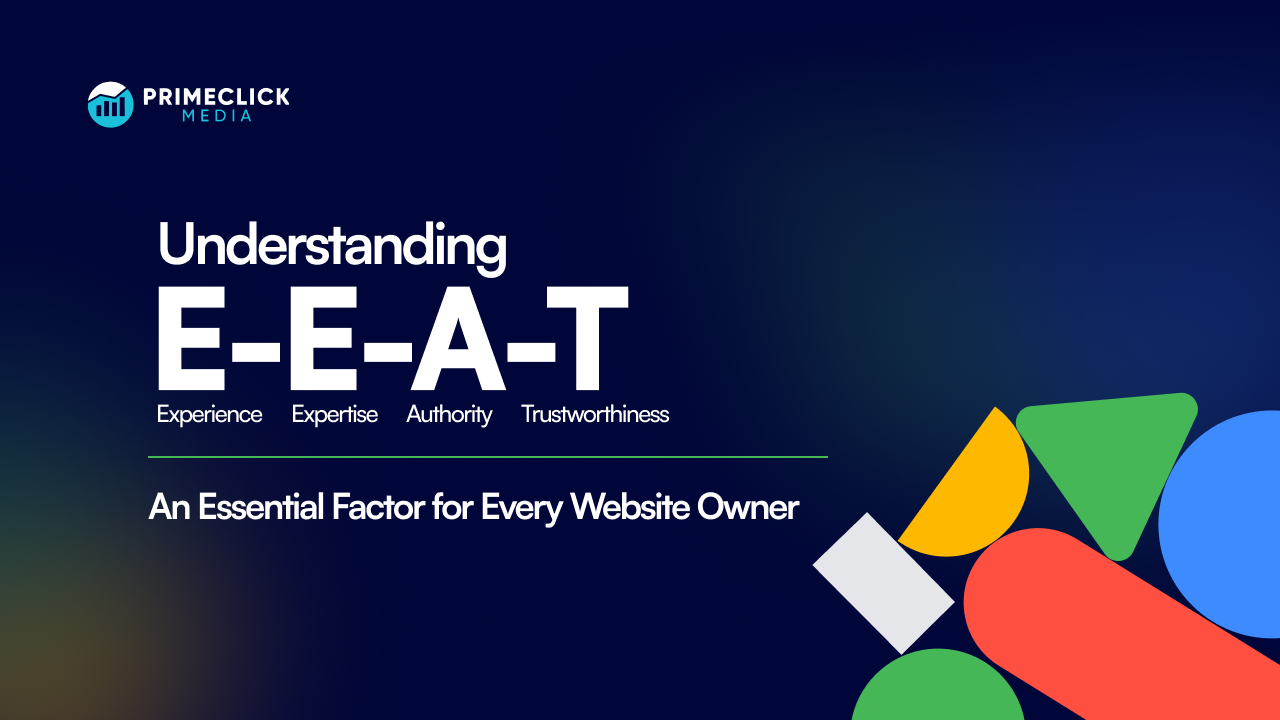
In today’s digital age, where competition for online visibility is fierce, every website owner wants to ensure their site ranks highly on Google. But how do you achieve that? One crucial factor to consider is Google’s E-E-A-T. No, we’re not talking about food here. E-E-A-T stands for Experience, Expertise, Authoritativeness, and Trustworthiness, and it’s a concept that Google uses to evaluate the quality of a website’s content.
In this article, we’ll delve into the importance of E-E-A-T and how it affects your website’s ranking. We’ll explore the factors that contribute to establishing experience, expertise, authoritativeness, and trustworthiness, including high-quality content, relevant backlinks, and user experience. Understanding Google’s E-E-A-T guidelines is vital for every website owner who wants to improve their search engine visibility and attract organic traffic.
Understanding E-E-A-T
An in-depth look at the E-E-A-T and its influence on search engine rankings and user trust:
1. Experience
Experience here means that being an expert isn’t limited to academic credentials. Anyone who possesses genuine, firsthand experience in a subject can be recognized as an authoritative source. This inclusive approach aligns with the diverse ways information is shared and consumed in today’s digital landscape.
One approach to showcasing experience is by sharing case studies, success stories, or examples that highlight how you or your team have effectively applied the knowledge you’re sharing. Furthermore, actively engaging with your audience through feedback, comments, and Q&A sessions can provide evidence of your experience and responsiveness.
2. Expertise
Expertise is a key component of E-E-A-T and focuses on the knowledge and skills of content creators or website owners. Google wants to ensure that the information provided on websites comes from individuals or organizations with a high level of expertise in their respective fields. This means that if you want your website to rank well, you need to demonstrate expertise in the content you create.
One way to establish expertise is by showcasing the qualifications, certifications, and experience of the content creators. This can be done through author bios, providing credentials, and linking to reputable sources or publications where the authors have been featured. Additionally, regularly updating and expanding your content to reflect the latest industry trends and developments can further establish your expertise in the eyes of both users and search engines.
3. Authority
Authority is closely related to expertise and trustworthiness. It refers to the reputation and influence your website or content has within your industry or niche. Google considers websites with high authority to be more reliable and valuable sources of information and therefore ranks them higher in search results.
To build authority, focus on creating high-quality content that is backed by research, data, and credible sources. Additionally, actively engaging with your industry or niche through guest blogging, participating in forums or discussions, and obtaining backlinks from reputable websites can further boost your authority. The more your website is seen as an authoritative source, the more likely it is to rank higher on search engine results pages.
4. Trustworthiness
Trustworthiness is another crucial aspect of E-E-A-T that Google considers when evaluating websites. Users need to trust the information they find online, especially when it comes to sensitive topics such as health, finance, or legal advice. Google aims to prioritize websites that have a track record of providing accurate and reliable information.
Building trustworthiness starts with transparency. Clearly stating the purpose of your website, providing contact information, and displaying clear privacy policies can help establish trust with your audience. Additionally, citing reputable sources, linking to authoritative websites, and avoiding misleading or false information are important factors in demonstrating trustworthiness.
The Importance of E-E-A-T for Website Rankings
Google’s primary goal is to provide users with the most relevant and reliable information for their search queries. By evaluating E-E-A-T, Google can determine the quality and credibility of websites, ensuring that users are directed to trustworthy sources.
Websites with high E-E-A-T are more likely to appear at the top of search results, increasing their visibility and organic traffic. On the other hand, websites with low E-E-A-T may struggle to rank well, resulting in a lack of visibility and a potential loss of business opportunities.
How to Improve Your Website’s E-E-A-T
To enhance your website’s E-E-A-T, focus on the following:
- Create high-quality, expert-driven content: Focus on producing well-researched, informative, and accurate content that demonstrates your expertise in your niche. This will not only establish your authority but also provide value to your audience.
- Optimize your website’s user experience: Ensure that your website is easy to navigate, loads quickly, and is mobile-friendly. A positive user experience will not only improve your E-E-A-T but also increase user engagement and conversions.
- Build a strong online presence: Engage with your industry through guest blogging, participating in forums, and networking with other experts. This will help build your authority and attract high-quality backlinks to your website.
- Stay up-to-date with industry trends: Regularly update your content to reflect the latest developments in your industry. This will show that you are actively involved and knowledgeable in your field, further establishing your expertise.
- About Us Page and Contact Information: Your website should have an informative “About Us” page that showcases the background, mission, and values of your website or company. Additionally, provide clear contact information, including a physical address and customer support, to demonstrate transparency, legitimacy, and accessibility.
Implementing E-E-A-T in your Content Strategy
To effectively implement E-E-A-T in your content strategy, consider the following:
- Keyword research: Conduct comprehensive keyword research to identify the topics and queries for which your target audience is searching. This will help you create content that addresses their needs and establishes your expertise.
- Content creation: Produce high-quality, informative content that showcases your expertise and provides value to your audience. Use a mix of formats such as blog posts, videos, podcasts, and infographics to cater to different preferences.
- Authorship: Clearly attribute your content to the relevant authors or experts within your organization. This will help establish their expertise and build trust with your audience.
- Credible sources: Cite reputable sources and link to authoritative websites to support your claims and provide additional resources for your audience.
- Social proof: Display testimonials, case studies, or client reviews to showcase your expertise and build trust with potential customers.
Tools and resources for monitoring and optimizing E-E-A-T
Several tools and resources like these can help you monitor and optimize your website’s E-E-A-T:
- Google Search Console: Use Google Search Console to monitor your website’s performance in Google search results, identify issues, and receive alerts. It provides insights into search traffic and keywords and helps you spot potential problems affecting E-E-A-T.
- Google Analytics: Use this to track user behaviour on your website, including traffic sources, user engagement, and conversion rates. This data can help you assess user satisfaction and the impact of E-E-A-T efforts.
- SEO and Keyword Research Tools: Utilize comprehensive SEO and keyword research tools like SEMrush, Moz Pro, Ahrefs, Ubersuggest, etc. These tools offer features such as tracking keyword rankings, analyzing backlinks, and providing insights into your website’s overall visibility, authority, and performance in search results.
- Yoast SEO (for WordPress users): If you’re using WordPress, the Yoast SEO plugin can help optimize your content for search engines and provide suggestions for improving readability and SEO factors.
- Social listening tools: Tools like HubSpot Social Media Management Software, Hootsuite, Sprout Social, Buffer, etc. can help monitor and manage your online reputation by tracking mentions and sentiment analysis.
Conclusion
Google’s E-E-A-T is a crucial factor that every website owner should prioritize. By understanding and implementing E-E-A-T principles, you can improve your website’s visibility, credibility and ultimately drive more organic traffic.
Our team at Primeclick Media is committed to helping your brand establish a strong online presence. Our expertise extends not only to creating captivating campaigns but also to creating landing pages and websites aligned with E-E-A-T principles, thereby enhancing your online presence. Contact us and let’s improve your digital presence together!




